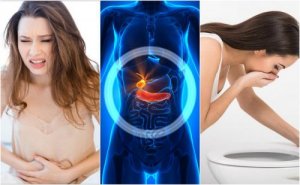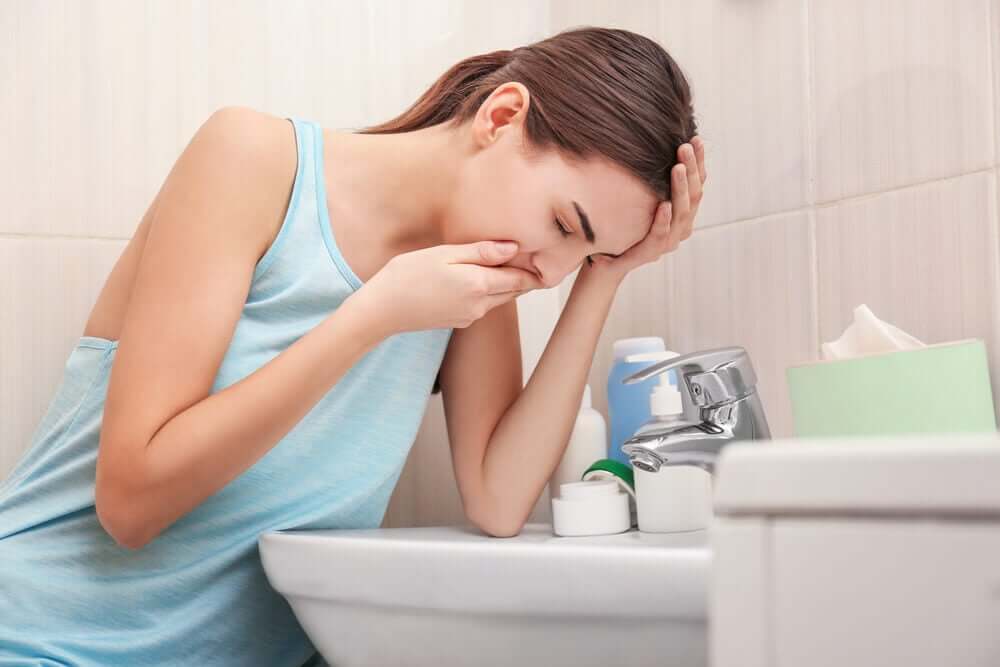Six Signs and Symptoms of Gallbladder Problems

You can detect gallbladder problems from the signs your body sends. So, what are those signs? Are they strictly linked to the digestive system or not? Let’s look at it below, but first, let’s review what the gallbladder is.
Your gallbladder is a small organ located under the liver. Its main task is to secrete bile which helps to break down fat and eases digestion.
Your body retains some substances in their ducts, thus generating obstructions that impede the passage of the bile. As a result, there’s a series of symptoms that, when not attended to in a timely manner, can have a negative impact on your quality of life.
Do gallbladder problems give warning signs?
Yes, when there are gallbladder problems the body sends out some warning signs. However, people tend to confuse them with other problems and therefore, don’t always give them due attention in time.
Here are the six signs that, according to the MSD Manual, can indicate that there are problems in the gallbladder, so you can go to the doctor and receive appropriate treatment.
1. Inflammation and gas

Once there are obstructions or difficulties in the ducts that facilitate the passage of bile, digestion becomes more difficult. In those situations, there may be symptoms such as inflammation of the stomach, the accumulation of waste (which when it isn’t expelled properly will ferment and cause discomfort), and excess intestinal gas.
Read about Ten Remedies to Control Intestinal Gas
2. Pain and abdominal heaviness
In addition to digestive discomfort, gallbladder problems produce abdominal pain and heaviness. This symptom, which sometimes extends to the right side of the back.
- The pain usually occurs suddenly and lasts about 15 minutes
- Then, it disappears and reappears, and is more and more intense, lasting between 12 and 15 hours
- A medical professional should analyze this symptom, as it can indicate the presence of gallstones
3. Gallbladder problems lead to nausea and dizziness
Nausea and recurrent dizziness are symptoms that can be caused by several different issues, and even when they don’t seem serious, they show us that something is wrong with the body.
When the gallbladder is unable to use bile juices in the process of digestion of fats, this increases the presence of waste in the intestine and blood. In addition, when gallstones form, pressure occurs in the stomach that can cause nausea and vomiting.

4. Bad breath
We know that bad breath can be caused by bacterial infections or poor hygiene habits. However, when it’s recurrent and doesn’t get better from better hygiene habits, then it may come from difficulties in the functioning of the liver, gallbladder, or both.
- In the latter case, there may be a metallic taste in your mouth that, together with the unpleasant smell, generates discomfort
- The accumulation of toxins and the low production of bile are responsible for this problem
Find out how to Fight Bad Breath Naturally with These Seven Remedies
5. Lack of appetite
Losing your appetite suddenly is a sign that something is not working well in your body. While it can occur due to chronic inflammatory diseases, it’s also common because of the digestive problems generated by the malfunction of the gallbladder.
- A lack of appetite that lasts several days may indicate that the bile ducts are inflamed or obstructed due to the formation of stones
- As the problem continues, affected patients feel inflammation and fullness
6. Gallbladder problems and jaundice
This condition comes from the accumulation of bilirubin in the blood. Bilirubin is produced in the liver and is excreted through the feces, thanks to traveling through the bile ducts. If there’s an obstruction then it will accumulate in the blood, giving a yellow tone to the skin.
Final comments
Do you recognize the symptoms mentioned? Do you have two or more of them? If so, see a doctor receive the relevant tests that can help detect problems in this organ. Furthermore, avoid auto-medicating.
As well as following the treatment, you should improve your health habits to improve the overall results of the treatment prescribed.
It’s vital to have a balanced diet, low in fried and processed food, good hydration, and a lifestyle as far away as possible from sedentariness and excesses of any kind.
All cited sources were thoroughly reviewed by our team to ensure their quality, reliability, currency, and validity. The bibliography of this article was considered reliable and of academic or scientific accuracy.
- Rogers, A. B., & Dintzis, R. Z. (2012). Liver and Gallbladder. In Comparative Anatomy and Histology. https://doi.org/10.1016/B978-0-12-381361-9.00013-5
This text is provided for informational purposes only and does not replace consultation with a professional. If in doubt, consult your specialist.








